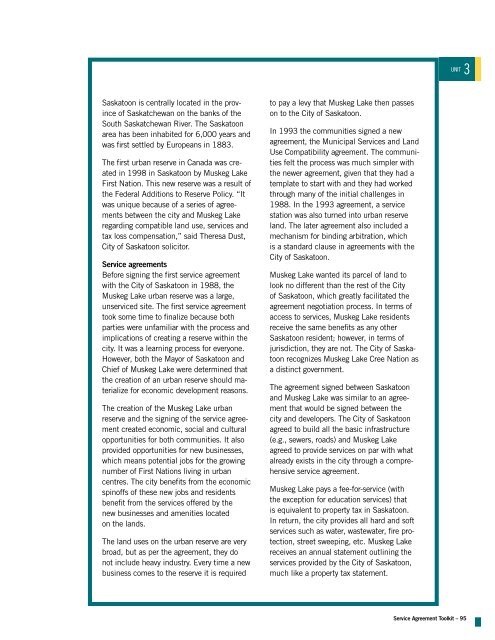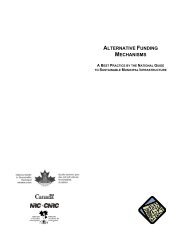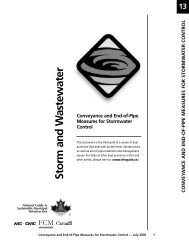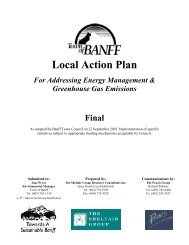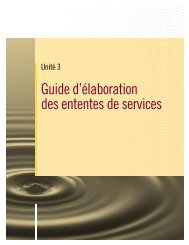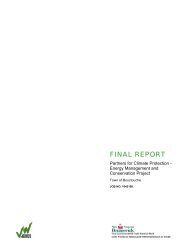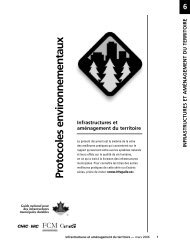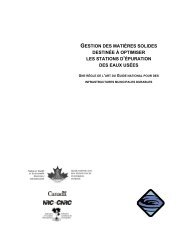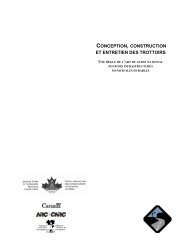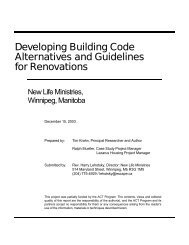Muskeg Lake First Nation and the City of Saskatoon - FCM
Muskeg Lake First Nation and the City of Saskatoon - FCM
Muskeg Lake First Nation and the City of Saskatoon - FCM
You also want an ePaper? Increase the reach of your titles
YUMPU automatically turns print PDFs into web optimized ePapers that Google loves.
<strong>Saskatoon</strong> is centrally located in <strong>the</strong> province<br />
<strong>of</strong> Saskatchewan on <strong>the</strong> banks <strong>of</strong> <strong>the</strong><br />
South Saskatchewan River. The <strong>Saskatoon</strong><br />
area has been inhabited for 6,000 years <strong>and</strong><br />
was first settled by Europeans in 1883.<br />
The first urban reserve in Canada was created<br />
in 1998 in <strong>Saskatoon</strong> by <strong>Muskeg</strong> <strong>Lake</strong><br />
<strong>First</strong> <strong>Nation</strong>. This new reserve was a result <strong>of</strong><br />
<strong>the</strong> Federal Additions to Reserve Policy. “It<br />
was unique because <strong>of</strong> a series <strong>of</strong> agreements<br />
between <strong>the</strong> city <strong>and</strong> <strong>Muskeg</strong> <strong>Lake</strong><br />
regarding compatible l<strong>and</strong> use, services <strong>and</strong><br />
tax loss compensation,” said Theresa Dust,<br />
<strong>City</strong> <strong>of</strong> <strong>Saskatoon</strong> solicitor.<br />
Service agreements<br />
Before signing <strong>the</strong> first service agreement<br />
with <strong>the</strong> <strong>City</strong> <strong>of</strong> <strong>Saskatoon</strong> in 1988, <strong>the</strong><br />
<strong>Muskeg</strong> <strong>Lake</strong> urban reserve was a large,<br />
unserviced site. The first service agreement<br />
took some time to finalize because both<br />
parties were unfamiliar with <strong>the</strong> process <strong>and</strong><br />
implications <strong>of</strong> creating a reserve within <strong>the</strong><br />
city. It was a learning process for everyone.<br />
However, both <strong>the</strong> Mayor <strong>of</strong> <strong>Saskatoon</strong> <strong>and</strong><br />
Chief <strong>of</strong> <strong>Muskeg</strong> <strong>Lake</strong> were determined that<br />
<strong>the</strong> creation <strong>of</strong> an urban reserve should materialize<br />
for economic development reasons.<br />
The creation <strong>of</strong> <strong>the</strong> <strong>Muskeg</strong> <strong>Lake</strong> urban<br />
reserve <strong>and</strong> <strong>the</strong> signing <strong>of</strong> <strong>the</strong> service agreement<br />
created economic, social <strong>and</strong> cultural<br />
opportunities for both communities. It also<br />
provided opportunities for new businesses,<br />
which means potential jobs for <strong>the</strong> growing<br />
number <strong>of</strong> <strong>First</strong> <strong>Nation</strong>s living in urban<br />
centres. The city benefits from <strong>the</strong> economic<br />
spin<strong>of</strong>fs <strong>of</strong> <strong>the</strong>se new jobs <strong>and</strong> residents<br />
benefit from <strong>the</strong> services <strong>of</strong>fered by <strong>the</strong><br />
new businesses <strong>and</strong> amenities located<br />
on <strong>the</strong> l<strong>and</strong>s.<br />
The l<strong>and</strong> uses on <strong>the</strong> urban reserve are very<br />
broad, but as per <strong>the</strong> agreement, <strong>the</strong>y do<br />
not include heavy industry. Every time a new<br />
business comes to <strong>the</strong> reserve it is required<br />
to pay a levy that <strong>Muskeg</strong> <strong>Lake</strong> <strong>the</strong>n passes<br />
on to <strong>the</strong> <strong>City</strong> <strong>of</strong> <strong>Saskatoon</strong>.<br />
In 1993 <strong>the</strong> communities signed a new<br />
agreement, <strong>the</strong> Municipal Services <strong>and</strong> L<strong>and</strong><br />
Use Compatibility agreement. The communities<br />
felt <strong>the</strong> process was much simpler with<br />
<strong>the</strong> newer agreement, given that <strong>the</strong>y had a<br />
template to start with <strong>and</strong> <strong>the</strong>y had worked<br />
through many <strong>of</strong> <strong>the</strong> initial challenges in<br />
1988. In <strong>the</strong> 1993 agreement, a service<br />
station was also turned into urban reserve<br />
l<strong>and</strong>. The later agreement also included a<br />
mechanism for binding arbitration, which<br />
is a st<strong>and</strong>ard clause in agreements with <strong>the</strong><br />
<strong>City</strong> <strong>of</strong> <strong>Saskatoon</strong>.<br />
<strong>Muskeg</strong> <strong>Lake</strong> wanted its parcel <strong>of</strong> l<strong>and</strong> to<br />
look no different than <strong>the</strong> rest <strong>of</strong> <strong>the</strong> <strong>City</strong><br />
<strong>of</strong> <strong>Saskatoon</strong>, which greatly facilitated <strong>the</strong><br />
agreement negotiation process. In terms <strong>of</strong><br />
access to services, <strong>Muskeg</strong> <strong>Lake</strong> residents<br />
receive <strong>the</strong> same benefits as any o<strong>the</strong>r<br />
<strong>Saskatoon</strong> resident; however, in terms <strong>of</strong><br />
jurisdiction, <strong>the</strong>y are not. The <strong>City</strong> <strong>of</strong> <strong>Saskatoon</strong><br />
recognizes <strong>Muskeg</strong> <strong>Lake</strong> Cree <strong>Nation</strong> as<br />
a distinct government.<br />
The agreement signed between <strong>Saskatoon</strong><br />
<strong>and</strong> <strong>Muskeg</strong> <strong>Lake</strong> was similar to an agreement<br />
that would be signed between <strong>the</strong><br />
city <strong>and</strong> developers. The <strong>City</strong> <strong>of</strong> <strong>Saskatoon</strong><br />
agreed to build all <strong>the</strong> basic infrastructure<br />
(e.g., sewers, roads) <strong>and</strong> <strong>Muskeg</strong> <strong>Lake</strong><br />
agreed to provide services on par with what<br />
already exists in <strong>the</strong> city through a comprehensive<br />
service agreement.<br />
<strong>Muskeg</strong> <strong>Lake</strong> pays a fee-for-service (with<br />
<strong>the</strong> exception for education services) that<br />
is equivalent to property tax in <strong>Saskatoon</strong>.<br />
In return, <strong>the</strong> city provides all hard <strong>and</strong> s<strong>of</strong>t<br />
services such as water, wastewater, fire protection,<br />
street sweeping, etc. <strong>Muskeg</strong> <strong>Lake</strong><br />
receives an annual statement outlining <strong>the</strong><br />
services provided by <strong>the</strong> <strong>City</strong> <strong>of</strong> <strong>Saskatoon</strong>,<br />
much like a property tax statement.<br />
UNIT 2<br />
UNIT 3<br />
Service Agreement Toolkit – 95


